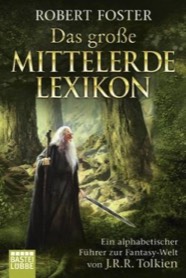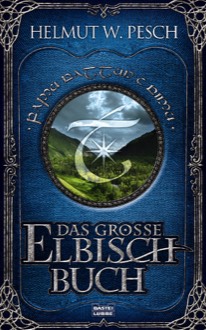
I would rather have written in Elvish, too ...
All titles on this page are available as printed books from Amazon and other internet sales platforms as well as in any German bookshop.

Robert Foster: The Complete Guide to Middle-earth (Das große Mittelerde-Lexikon) Tolkien's world from A to Z.
The standard reference work to the world of The Lord of the Rings, The Hobbit, and The Silmarillion. People, settings, background information: an exhaustive dictionary to Tolkien's fantasy world of Middle-earth, including translations of all names and terms. Competently revised and updated, taking into account Tolkien's posthumously published manuscripts and studies. With extensive references to the German translations by Margaret Carroux, E.-M. von Freymann, Hans Schütz and Wolfgang Krege. Supplemented by a chronology of the First Age and ten genealogical trees.
When the first "Lord of the Rings" movie was drawing near, Bastei Lübbe publishers were asked if there were interested in publishing a German edition of Robert Foster's Complete Guide to Middle-earth (1978). Inevitably, the project was passed on to me, as the resident Tolkien freak, to see whether this would be feasible or not. "Well", I said, "if I am allowed to carefully revise and update the text ..." Of course I hadn't thought of what this would imply. The major problem was not the text itself, which had stood up to time admirably well, but the various German translations which interpreted many terms in different ways (and even differently within a single text).
The revised 2nd edition reverts to the first translation of The Lord of Rings by Margaret Carroux (1970/71), which was also used as a basis for the German text of the movies, rather than using the newer and often justly criticised version by Wolfgang Krege (1999). Again, this involved a complete revision of the dictionary, with a different structure of headwords. In the end, I am happy to quote Marcel Bülles, founder of the German Tolkien Society, who said: "The best dictionary on Tolkien's world of Middle-earth is only available in German - namely this one. Apart from that, I use it myself as a useful reference - for even I can't keep track of everything."

The Book of Elvish (Das große Elbisch-Buch)
Grammar, script and dictionary of J.R.R. Tolkien's Elven languages with appendices on the languages of Dwarves and OrcsThe standard reference work on the Elven languages – thoroughly revised and updated by incorporating the latest findings in Tolkien linguistics, including J.R.R. Tolkien's notes on "Words, Phrases and Passages in 'The Lord of the Rings'". The Book of Elvish contains:
• A comprehensive introduction to the Elven languages Quenya and Sindarin.
• Word-by-word translations of all elvish texts and phrases in The Lord of the Rings, The Silmarillion and Unfinished Tales.
• New background information, new perspectives and many previously unknown word forms and vocabularies.
• Tables and explanations of the various modes of the tengwar and cirth scripts.
• Expanded dictionaries Elvish–German and German–Elvish containing more than 7,000 entries (approx. 3,800 for Quenya and 3,300 für Sindarin), including names.
• Separate chapters on Khuzdul (the Dwarven language) and the Black Speech (including a detailed analysis of the ring inscription).
After the German edition of The Complete Guide to Middle-earth had proved quite successful, there was the inevitable follow-up question, "What do we do when the next film is coming?" – "Well", I said (again), "I've compiled several folders of material on Tolkien's imaginary languages. I don't suppose that this sort of thing would find as many readers as the dictionary, but ..." Well, I was wrong. Not only about the amount of work involved. First there was Elvish: Grammar, Script and Dictionary of J.R.R. Tolkiens Elven language (Elbisch: Grammatik, Schrift und Wörterbuch der Elben-Sprache J.R.R. Tolkiens, 2003) with Elvish–German wordlists, and in the next year, Elvish: A Teach Yourself Book of J.R.R. Tolkien's Elven Languages (Elbisch: Lern- und Übungsbuch der Elben-Sprachen J.R.R. Tolkiens, 2004) with wordlists German–Elvish. The success was overwhelming, the criticism likewise. Of course, I had made use of the available secondary sources, and, admittedly, not always with the necessary care and circumspection. Also, there was a heated debate going on right then about the proper use of Tolkien's material, and "real" vs "neo" Elvish. I had only intended to write a modest introduction to this fascinating subject – and presumably succeeded better than I had thought.
Later, after Tolkiens own "Words, Phrases & Passages in 'The Lord of the Rings'" (Parma Eldalamberon 17 [2007]) had been published, I decided to do a thorough revision of what I had written. The Book of Elvish was rather written for me than for an audience. It is the only book of mine where I missed the deadline so that publication had to be postponed – no wonder at 891 pages in trade paperback. It is certainly a challenge for the uninitiated, but you may expect a little bit of effort with a masterpiece such as Tolkien's language creation, or is that asking too much?
The first two "Elvish" books are no longer available, but there is now an updated teach-yourself-book available, Elvish for Beginners (Elbisch für Anfänger, 2015), both as a single mass market paperback volume and as two separate e-books for Quenya and Sindarin.